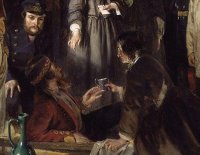This is the third post in a series on Henry Drummond's essay on love.
 Here we see how he checks through Paul's list of other great things.
Here we see how he checks through Paul's list of other great things.Paul lists eloquence, prophecy, mysteries, faith, charitable giving and sacrifice.
Although Drummond writes that these things are self-evidently inferior, he still finds some useful things to say about them.
Paul begins by comparing love with other things that were treasured in the Graeco-Roman world. I won't cover them in detail; their inferiority is clear.
He draws a contrast with eloquence. It's a wonderful gift – it can influence hearts and minds, rousing people to high purpose and holiness in action. Paul says, “If I speak in the tongues of men and of angels, but have not love, I am only a resounding gong or a clanging cymbal.” We all know why. We've all sensed the brassiness of words without emotion, the hollow and curiously unconvincing eloquence that lacks underlying love.
Drummond draws our attention to something we all know to be true, the fact that fine words may not reflect what is in the heart. Love is greater than eloquence because words without love have no depth of foundation. We have the ability to notice this and it's important that we pay attention when it happens.
[Paul] also contrasts love with prophecy, mysteries, faith, and charitable giving. Why is Love greater than faith? Because the end is greater than the means. And why is it greater than charitable giving? Because the whole is greater than the part.
What is the use of having faith? It connects the soul with God. And what is the purpose of connecting with him? So that we may become like him. But God is love, so faith (the means) is so that we can love (the end). Love is clearly greater than faith. “If I have a faith that can move mountains, but have not love, I am nothing.”
It's greater than giving, once again because the whole is greater than the part. Giving is only a small part of love, one of its many avenues. There's a great deal of loveless giving. It's easy enough to toss a coin to a beggar on the street, in fact it's often easier than not doing it. But love is often in the holding back. A few pennies buys relief from our feelings of sympathy. It's too cheap for us, and it's often too costly for the beggar. If we truly loved him we'd either do more, or we'd do less. “If I give all I possess to the poor, but have not love, I gain nothing.”
Drummond skips right over prophecy and the understanding of mysteries as not requiring any explanation. Love is clearly greater than those things. But he does give some attention to faith and to charitable giving.
He argues that the end is always greater than the means and shows that faith is merely the means for reaching the Almighty One who is love in person. And if we have faith but we still don't have him, our faith is worthless. Faith gets it value from the one it allows us to reach.
And in the case of giving, he points out that it's just a part of love and the whole is always greater than a part. Giving is one way of demonstrating love. We can even give without love, an empty and meaningless act. Drummond's illustration is interesting.
The beggar in the street is still with us. But giving a few coins is a poor substitute for real love. Perhaps it makes us feel better but it won't go very far and it may be spent on something that will make the problem even worse. It would be more loving to bring a cup of tea, a sandwich, a new coat, and a listening ear. Because of the harm mere money can do it might even be more loving to give nothing at all!
Then Paul contrasts it with sacrifice, even death. “If I surrender my body to the flames, but have not love, I gain nothing.” Missionaries can take nothing better to the unsaved than the mark and reflection of God's love on their own characters. That's a universal language! It takes years to learn a foreign language but from the day they arrive, a love that everyone understands will be pouring out unaware but eloquently.
It's not words that are the missionary, it's the person. A person's character is the real message. In deepest Africa near Lake Victoria I've met Negroes who remembered David Livingstone. Their faces light up as they talk about the first white person they ever saw, the kind doctor who passed that way years earlier. They didn't understand what he said, but they felt the love that was in his heart. They knew it was love even though he didn't say so.
Take that simple charm into the workplace where you plan to spend your life, and your life's work will succeed. You can't take anything more, but you need nothing less. Whatever your
accomplishments and your readiness for sacrifice, if you surrender your body to the flames but are without love, it will benefit you and Christ's purpose – nothing!
Here, surely, Henry Drummond has touched on the core of my life as a follower of Jesus - my character (yours too). It's not about what I do, it's about who I am in Christ. If Jesus doesn't shine out in my words and actions I can go to the greatest lengths and remain utterly ineffective. That is why Paul wrote in Colossians 1:27, 'Christ in you, the hope of glory'. There is no other hope, no hope in us as we are. Only as Christ expresses himself through us do we see effective fruit.
< The fulfilment of the law | Index | No later items >




